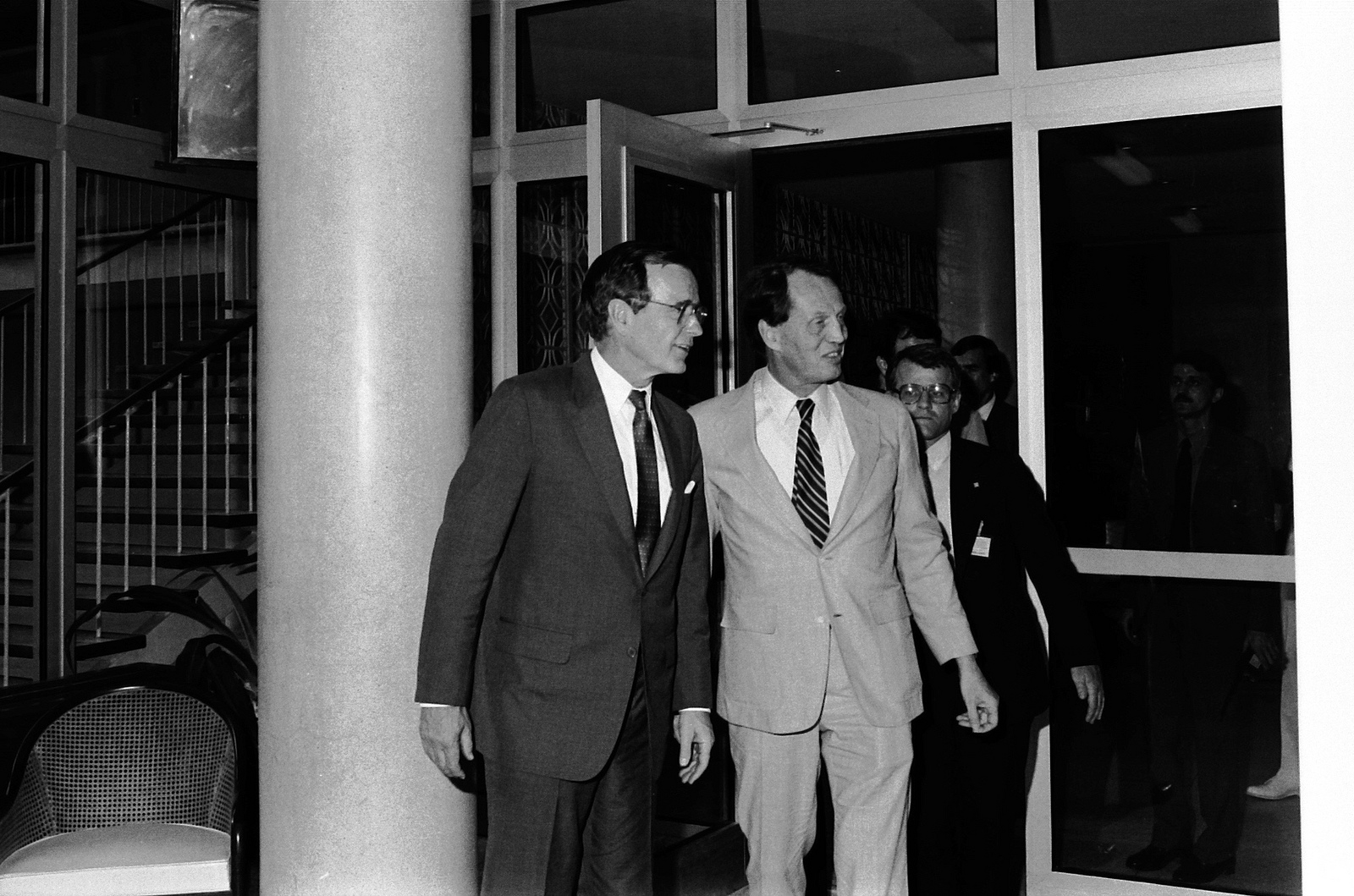President George H.W. Bush had a massive Washington sendoff yesterday, complete with heartfelt speeches and a dazzling array of hagiographic headlines; to read about the former president today, one might think he was a saint who singlehandedly saved the world from Cold War destruction while serving as a model of political integrity, conjuring up wistful feelings for a bygone era when politics was respectable and even in disagreement, people could be civil.
Inevitably, his funeral was treated as a referendum on the current president of the United States, who was widely praised for managing to adhere to a bare minimum of behavioral expectations for funerals. Some argue that the GOP Bush helped build has been completely upended by Trump, who represents an abrupt party realignment that marks the end of “compassionate conservatism,” of which Bush was evidently a practitioner.
But this is all bullshit. We know it all to be bullshit, and the media’s insistence on glorifying the dead rather than acknowledging the tremendous harm they caused is a pernicious habit. There’s no need to honor the legacy of a man who did deeply dishonorable things to get into office — chief among which was the racist Willie Horton ad that some say clinched the vote for him — let alone while he was in office.
Bush and his predecessor, Ronald Reagan, laid the groundwork for the extreme economic inequality that plagues the United States today, effecting a massive wealth transfer from working-class people to the rich. He bitterly fought initiatives like raising the minimum wage and favored big business throughout his term in office; arguably, some of the extreme suffering that characterizes being poor in America can be directly attributed to his policies of profits at all costs.
And while some in the disability community have lauded his work on the Americans with Disabilities Act (ADA), which he signed into law, they’ve glossed over his extremely poor overall record on civil rights, such as vetoing attempts at expanding civil rights and voter registration outreach programs and promoting the racist and counterfactual “war on drugs.” They’ve also ignored his handling of the HIV/AIDS crisis, and the needless suffering and death caused by the delays he propagated; an entire generation of LGBQT people was lost because of Bush’s policies.
During his four years in office he appointed two Supreme Court justices, including the extremely conservative Clarence Thomas, whose bitter confirmation hearings were marred by accusations of sexual harassment from attorney Anita Hill, who bravely came forward to confront him in an era before #MeToo and was pilloried for it. Indirectly, through that nomination, he laid the groundwork for his son to steal the election in 2000, with Bush v. Gore effectively handing it to George W. Bush despite outcry; notably, his son’s reputation is also being rehabilitated in the Trump era as though his gross indecencies were little more than missteps.
George H.W. Bush supported flag burning bans, censorship of the arts, and school prayer, all topics that still heavily motivate conservatives. Needless to say, he was opposed to abortion. His policy also pushed coerced sterilization onto Native American women, a reminder that Republicans long to control marginalized women’s bodies by any means possible. Despite claiming support for the use of contraceptives to indirectly reduce the abortion rate, he maintained the “global gag rule” that made it difficult for health care providers receiving foreign aid from the U.S. to provide their patients with accurate, complete, and detailed information about their reproductive choices.
This was only a subset of his problematic legacy overseas; he oversaw the invasion of Panama in 1989 and the “highway of death” during the First Gulf War, a military conflict that itself set the stage for messy and prolonged conflict in the region, driving the formation of Al Qaeda and a legacy of misery that endures today.
Like Trump, he was also a fan of dictators. Also like Trump, he was accused of sexual harassment and assault by multiple women.
This is just a small slice of who Bush was, and yet, it’s one that was poorly represented in most headlines yesterday, save for a few outliers bold enough to identify the Bush nostalgia and note that it clearly hearkens back to a longing for establishment elites; just as hateful as Trump, but more polished about it.
Like many terrible people, Bush engaged in individual acts of kindness and was undoubtedly loved by his family and close friends. At times, he even promoted good policy, but this does not erase the legacy he left behind. While one expects the right to engage in mythologizing about a bygone hero of the party, it’s disappointing to see many leaders on the left falling all over each other to praise the dead in a performative politics that serves only to sweep his misdeeds under the rug, giving him an undeserved place in history.
We should not remember him as a “great and noble man” but as one who enabled a political dynasty that did cascading harm across the U.S. and the world.
Photo: U.S. Embassy New Delhi

